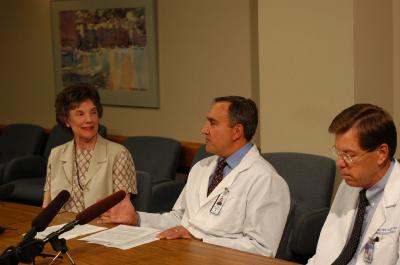October 9, 2003
UW to lead regional biodefense center
The UW is the lead institution for one of eight Regional Centers of Excellence for Biodefense and Emerging Infectious Diseases Research, the federal Department of Health and Human Services announced early in September. The centers are being funded by grants totaling approximately $350 million dollars over 4.5 years, with approximately $50 million going to the UW-led research. The grant is administered and funded by the National Institute of Allergy and Infectious Diseases (NIAID).
The WWAMI (Washington, Wyoming, Alaska, Montana and Idaho) Regional Center of Excellence will develop a program of basic research, education, and training in biodefense and emerging infectious diseases with a focus on Gram-negative bacterial pathogens.
Research will initially focus on the bacteria Yersinia pestis, Francisella tularensis and Burkholderia pseudomallei. None of these agents requires the highest biosafety containment level, in contrast to viral agents such as smallpox and Ebola virus.
“Our ultimate goals include developing vaccines and therapies to protect people from these microorganisms,” said Dr. Samuel Miller, the center’s director and professor of medicine, microbiology and genome sciences at the UW School of Medicine.
The WWAMI center will engage in basic research on bacteria with the goal of translating that information into new treatments and vaccines. It will not engage in weapons-related research. Its goals are the protection of the population through preventive medicine, and as such it will function as part of the UW’s internationally known infectious disease research program. The group will also study the pathophysiology of airway infection and inflammation. The information from the center will support other infectious disease research. The center will help educate and train medical students, physicians and scientists in five states, and will provide clinical training at hundreds of sites.
A number of other institutions are participating in the Regional Center of Excellence, including the Fred Hutchinson Cancer Research Center, Harborview Medical Center, the Institute for Systems Biology and the VA Puget Sound Health Care System, as well as the University of Idaho in Moscow, and NIAID’s Rocky Mountain Laboratories in Hamilton, Mont.
The primary goal of the nationwide program is to foster the physical and intellectual environments in which wide-ranging research on infectious diseases can proceed productively and safely, federal officials say. The center at the UW will:
- Support investigator-directed research.
- Train researchers and other personnel for biodefense and emerging infectious diseases research activities.
- Create and maintain supporting resources, including scientific equipment and trained support personnel, for use by the center and other researchers in the region.
- Emphasize research focused on development and testing of vaccines, therapies and diagnostic concepts.
- Make available core facilities to approved investigators from academia, government, biotech companies and the pharmaceutical industry.
- Provide facilities and scientific support to first responders in the event of a national biodefense emergency.
Additional information on NIAID’s biodefense program is available at http://www.niaid.nih.gov/biodefense/html. NIAID is a component of the National Institutes of Health.



